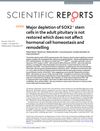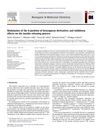 91 citations,
April 2017 in “Diabetes & Metabolic Syndrome: Clinical Research and Reviews”
91 citations,
April 2017 in “Diabetes & Metabolic Syndrome: Clinical Research and Reviews” Eating fewer calories, less sugar and refined carbs, and more low-glycemic and omega-3 rich foods can help manage PCOS symptoms.
 73 citations,
February 2007 in “The American Journal of Medicine”
73 citations,
February 2007 in “The American Journal of Medicine” PCOS is a common hormonal disorder in women, treated with lifestyle changes and medications like hormonal contraceptives and metformin.
 71 citations,
January 2014 in “Journal of Proteome Research”
71 citations,
January 2014 in “Journal of Proteome Research” Women with PCOS have different levels of certain fats and proteins in their blood, which could help diagnose the condition.
 69 citations,
February 1983 in “Gut”
69 citations,
February 1983 in “Gut” Men with coeliac disease may have hormone imbalances that could affect sexual function, but these can improve with better gut health.
 60 citations,
January 2004 in “The journal of investigative dermatology/Journal of investigative dermatology”
60 citations,
January 2004 in “The journal of investigative dermatology/Journal of investigative dermatology” Applying a specific inhibitor lightens skin and hair color.
 31 citations,
September 2006 in “International journal of gynaecology and obstetrics”
31 citations,
September 2006 in “International journal of gynaecology and obstetrics” New treatments for PCOS focus on insulin resistance and reducing testosterone levels, along with traditional hormone therapies.
 29 citations,
February 2018 in “Genetics research international”
29 citations,
February 2018 in “Genetics research international” Certain genetic variations are linked to increased androgen levels in PCOS, but more research is needed to understand these connections fully.
 29 citations,
October 1988 in “Journal of Steroid Biochemistry”
29 citations,
October 1988 in “Journal of Steroid Biochemistry” Antiandrogens are effective for conditions like prostate cancer and skin issues, but more research is needed to confirm their benefits and minimize side effects.
 24 citations,
October 1994 in “Fertility and Sterility”
24 citations,
October 1994 in “Fertility and Sterility” People with hair loss may have different levels of certain hormones due to changes in hormone processing.
 22 citations,
November 2017 in “Scientific Reports”
22 citations,
November 2017 in “Scientific Reports” The pituitary gland functions normally even after losing most SOX2+ stem cells.
 22 citations,
February 2002 in “Planta Medica”
22 citations,
February 2002 in “Planta Medica” Compounds from Angelica koreana roots, especially osthenol, could be effective for treating conditions like prostate disease and hair loss.
 19 citations,
July 1990 in “Cleveland Clinic journal of medicine”
19 citations,
July 1990 in “Cleveland Clinic journal of medicine” Androgen excess disorders in women were effectively treated with spironolactone, estrogen, and dexamethasone.
 16 citations,
October 2020 in “Lipids in Health and Disease”
16 citations,
October 2020 in “Lipids in Health and Disease” Leptin affects skin and hair health and may worsen some skin conditions, but more research is needed to understand its full impact.
 13 citations,
May 2011 in “Bioorganic & Medicinal Chemistry”
13 citations,
May 2011 in “Bioorganic & Medicinal Chemistry” Changing the 6-position on benzopyran molecules affects insulin release, with some compounds showing strong inhibitory effects.
 11 citations,
May 2003 in “Obstetrics and gynecology (New York. 1953. Online)/Obstetrics and gynecology”
11 citations,
May 2003 in “Obstetrics and gynecology (New York. 1953. Online)/Obstetrics and gynecology” Hirsutism in women often indicates a hormonal imbalance and can be managed with a combination of hormonal treatments and hair removal methods.
 10 citations,
January 2014 in “Endocrinology & metabolic syndrome”
10 citations,
January 2014 in “Endocrinology & metabolic syndrome” PCOS is a long-term condition that needs more research for better understanding and treatment.
 7 citations,
April 2021 in “Journal of advanced pharmaceutical technology & research”
7 citations,
April 2021 in “Journal of advanced pharmaceutical technology & research” The compound 16 from the Merremia peltata plant could potentially be a good treatment for hair loss (alopecia) due to its strong activity and favorable skin absorption.
 4 citations,
July 2017 in “Medicine”
4 citations,
July 2017 in “Medicine” The document concludes that managing PCOS involves lifestyle changes, medication for symptoms, and weight loss for fertility improvement.
 4 citations,
September 2015 in “Case Reports”
4 citations,
September 2015 in “Case Reports” A man fainted and felt unwell after using a strong hair growth product, but got better when he stopped using it.
 2 citations,
October 2008 in “The Journal for Nurse Practitioners”
2 citations,
October 2008 in “The Journal for Nurse Practitioners” The document concludes that managing PCOS requires a comprehensive approach, including lifestyle changes and medication, to improve symptoms and reduce health risks.
 May 2022 in “Acta Scientific Women's Health”
May 2022 in “Acta Scientific Women's Health” A woman lost over 80% of her hair due to a condition called telogen effluvium after having COVID-19.
 March 2010 in “Ejc Supplements”
March 2010 in “Ejc Supplements” Chemotherapy significantly lowers Inhibin A levels in breast cancer patients.
 August 1994 in “Molecular Endocrinology”
August 1994 in “Molecular Endocrinology” Changing protein kinase levels in pituitary cells affects calcium flow and beta-endorphin release.
 December 1988 in “Journal of The American Academy of Dermatology”
December 1988 in “Journal of The American Academy of Dermatology” The meeting covered new findings in children's skin conditions and treatments, including the benefits of super absorbent polymer diapers.
 May 1963 in “American journal of obstetrics and gynecology”
May 1963 in “American journal of obstetrics and gynecology” Injecting 2 ml of TEEV every 4 weeks is better because it has the same benefits but fewer side effects.
 1415 citations,
October 2007 in “European Journal of Epidemiology”
1415 citations,
October 2007 in “European Journal of Epidemiology” The Rotterdam Study investigates diseases in older adults and has produced many research findings.
 991 citations,
January 2011 in “Nature Reviews Endocrinology”
991 citations,
January 2011 in “Nature Reviews Endocrinology” The document concludes that PCOS is a complex disorder caused by both genetic and environmental factors, affecting women's health in various ways, and requires personalized treatment.
 431 citations,
October 2008 in “Current Medicinal Chemistry”
431 citations,
October 2008 in “Current Medicinal Chemistry” Coumarin derivatives show promise as anti-estrogenic agents for treating breast cancer, with some in clinical trials.
 257 citations,
July 2018 in “Obstetrics & Gynecology”
257 citations,
July 2018 in “Obstetrics & Gynecology” PCOS is a complex disorder in women that can lead to various health risks and requires personalized treatment.
 219 citations,
September 2009 in “European journal of epidemiology”
219 citations,
September 2009 in “European journal of epidemiology” The Rotterdam Study aims to understand various diseases in older adults.






























